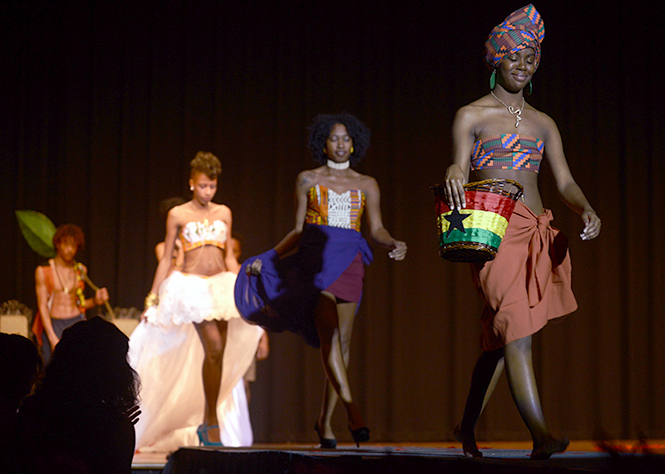Black United Students evolves as racial issues change
Model’s walk the runway during the talent portion of the 45th annual Black United Students Renaissance Ball, Nov. 13, 2013.
February 27, 2014
Gene Shelton, professor of journalism, was a Kent State student in the 70s and member of Black United Students. He recalls participating in a walk out, something he had never done before, and how other members of Black United Students encouraged his activism.
“I remember when we staged a walkout protesting the university’s failure of addressing the needs of African-American students,” he said. “I went home to Cleveland and my father ordered me back to campus. I came back to Kent but not to campus: I stayed at a frat house until BUS said it was OK to return.”
As times change and opinions progress, Black United Students remains true to its founding goals of unity, advancement and education while continuously evolving.
Founded in a time of racial turmoil, Black United Students held great influence on campus during the 1970s. The group consistently staged protests to fight for equal rights both on and off campus.
In 1968, BUS staged a mass walk out that lead to the creation of an Afro-American studies program, recruitment of more African-American faculty and staff, and development of a grant fund.
Prior to the walk out 300 students from BUS, as well as the Anti-Vietnam War Group and Students for a Democratic Society locked arms to create a barrier around the Student Activities Center to prevent the Oakland Police Department from entering.
When then university President Robert I. White announced the university would press charges against protesters, the group disbanded, but students continued to demand justice. That Sunday, Nov. 18, 250 luggage-toting African-American students walked off campus, marking what the breaking point in President White’s wish to prosecute students.
Two days after the walkout, White retracted his initial statement and agreed not to pursue legal action.
In 1967, Black United Students, or BUS, had been operating underground before becoming the first registered student organization on campus, as well as the first student-run Black Nationalist Organization.
From the start, BUS protected African-American students and their heritage, Shelton said. Among one of the organization’s first accomplishments was expanding famous black historian Carter G.
Woodson’s Negro Week into Black History Month. The celebration was recognized nationally in 1976 by President Gerald Ford.

Since its days striving for equality, Black United Students has evolved as much as the campus around it, making more subtle gains than in its formative years.
“Times have changed. Students and issues are different,” said Shelton. “The BUS voice has changed.”
Ashley Tolliver, recent graduate and past president of Black United Students, says that though the group may not seem as active in recent years, it is focusing more on creating a more inclusive and educated college community.
“I joined BUS at a different time than my professors,” she said. “For them, living on campus was a struggle; they had to fight for basic rights.
Discrimination and racial injustice are still alive, but in a more subtle form: It’s natural that BUS would adopt a different approach to addressing it.
Instead of protests, BUS provides students of all ethnicities with educational programming, such as diversity talks and speakers, as well as opportunities for these students to showcase their talents and voice their concerns.
Roslynn Porch, current president of Black United Students, said these programs develop a strong sense of community within African-American students.
“We provide educational, cultural and social activities which relate to past, present and future goals and aspirations of Black people,” she said. “We want to insure our students have enriching experiences and continue the development of a progressive environment conducive to black students’ quest to obtain a high-quality education.”
Looking toward the future, Porch hopes to stay true to Black United Student’s trailblazing past, while continuing to grow and evolve both on and off campus.
“We must continue to advocate, inform our students and making sure that they’re voices are being heard,” she said. “I can see Black United Students not only making progress on Kent State’s campus but in the community as well: We just need to continue our action and efforts to progress.”
Contact Michael Lopick at [email protected].

























